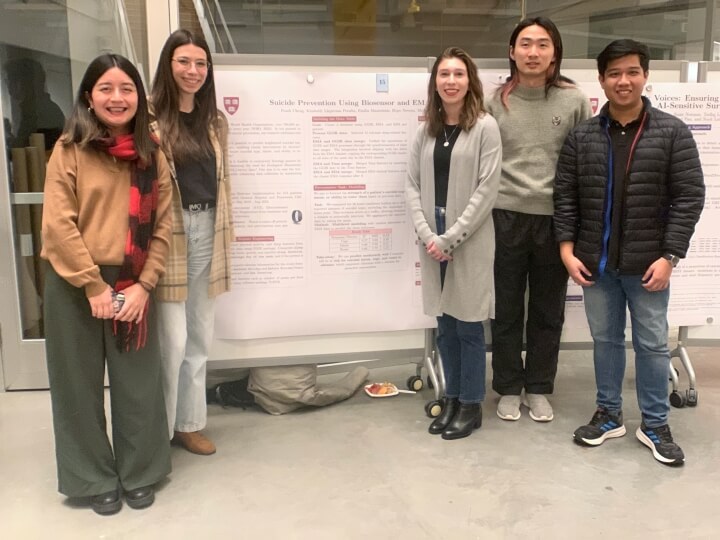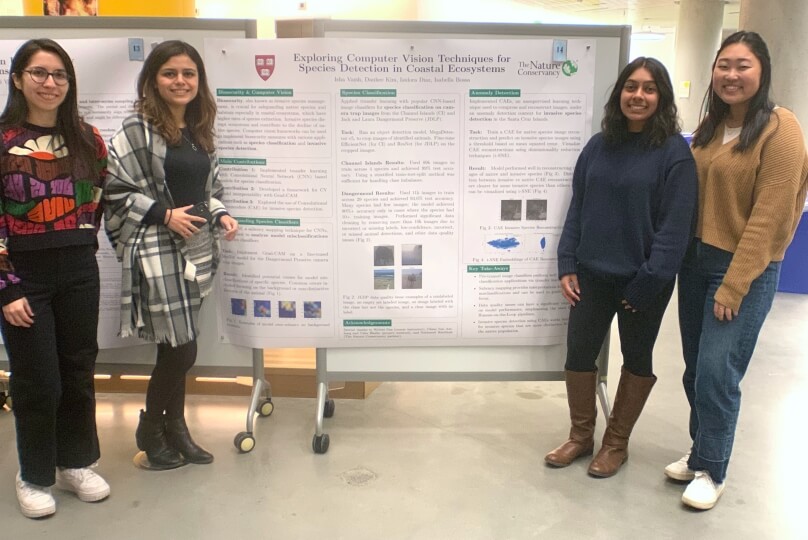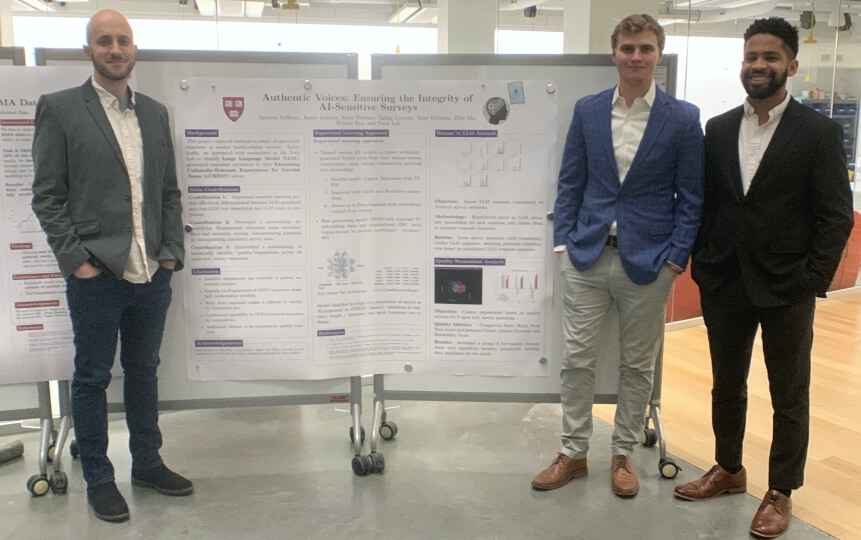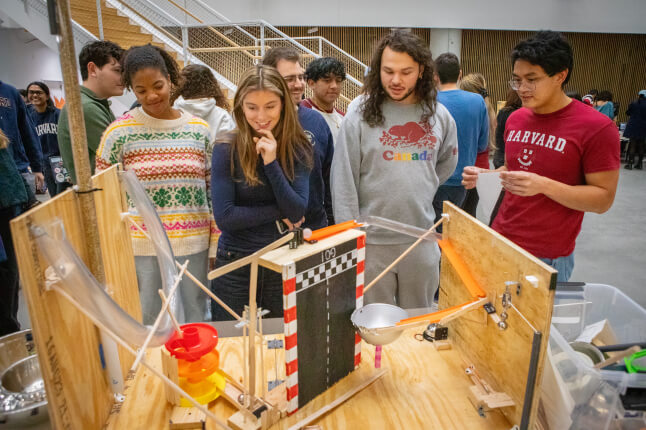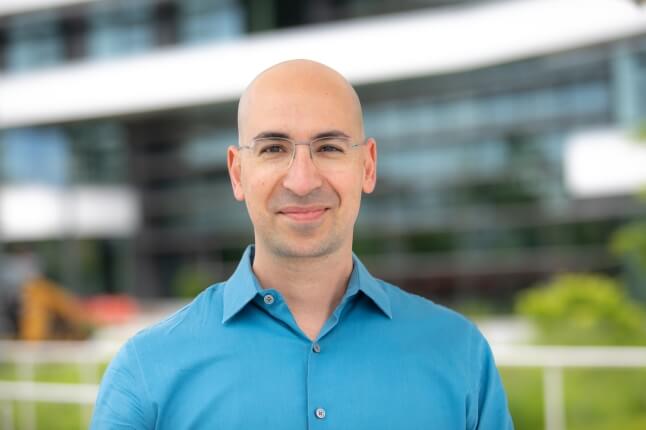News
"Suicide Prevention Using Biosensor and EMA Data," by Frank Cheng, Kimberly Llajaruna Peralta, Emilia Mazzolenis, Hope Neveux and Michael Sam (Matt Goisman/SEAS)
Conversations about artificial intelligence (AI) frequently veer toward its negative impact – on industries such as technology, finance or creative arts. But AI also has the potential to benefit numerous domains in ways that improve the planet or human lives. In an ecosystem, for example, machine learning could help cameras detect potentially invasive species far faster than human eyes could, preventing potentially catastrophic disruption. Negotiators in a humanitarian crisis, as another example, could use AI to quickly research the stakeholders involved in a negotiation, leading to more fruitful deliberations.
Students taking “AC297R: Computational Science and Engineering Capstone Project” at the Harvard John A. Paulson School of Engineering and Applied Sciences (SEAS) spent their fall semester working with partner organizations to research new frontiers of applied artificial intelligence. They recently presented their projects at the Science and Engineering Complex.
“AI is in the zeitgeist right now,“ said Weiwei Pan, Assistant Director for Graduate Studies in Data Science and course instructor. “You can apply your AI interest to any domain, and part of the Capstone is about allying us with more interesting partners who are not traditionally featured in the AI space.”
All 16 group Capstone projects delved into some combination of four research topics: mental health, humanitarian negotiation, conservation, and data security. For many data science students, these were areas of research they’d never considered before starting the program
“I hadn’t studied mental health in any capacity here, and had been focused on hardcore STEM subjects,” said Kane Norman, a data science student whose team researched how to detect AI-generated responses to mental health surveys. “I think this was a really good way for me to learn how to utilize my skills in a non-STEM-focused area. These are really good opportunities for mental health, physical health and social improvement that AI can be used for, and I hope our projects help bring awareness to them.”
Emilia Mazzolenis’s team also tackled AI and mental health, but their project focused on training machine learning models to predict suicidal intent and urge from questionnaire data and physiological data derived from wearable technology like smartwatches.
Some people hold the misconception that AI exclusively belongs to big tech, but that’s not the case. AI can impact so many different disciplines, from mental healthcare and agriculture to education.
"These types of projects can open the eyes of the community to the extensive potential that lies within responsible AI," Mazzolenis said.
"Exploring Computer Vision Techniques for Species Detection in Coastal Ecosystems," by Isha Vaish, Danhee Kim, Isidora Diaz and Isabella Bossa (Matt Goisman/SEAS)
Isabella Bossa’s team worked with the Nature Conservancy to build computer vision algorithms to perform species classification and anomaly detection on images from camera traps set up in coastal ecosystems in California, training the models on approximately 100,000 images. Other conservation projects looked at species detection algorithms and mapping agricultural plastic use in California.
“It’s not something I would’ve envisioned if the Capstone hadn’t partnered us with the Nature Conservancy. It really broadened my perspective,” Bossa said. “It’s a very positive outlook for the future of AI research. There have been so many concerns about what AI can do, its potential downsides. But these projects show that AI can be used for good.”
Frontline Negotiation is an international organization for negotiators that work to bring humanitarian aid to regions in need. Several SEAS groups worked with the organization to develop tools negotiators could use to more quickly learn all the different stakeholder groups involved in a specific situation or crisis.
“Stakeholder mapping is a modular procedure used by frontline negotiators to identify all the stakeholders, and then based on all available information and contextual knowledge, a frontline negotiator will map the stakeholders into four quadrants,” said Boxiang Wang. “Our tools automate that process to achieve really accurate and fascinating results. That drastically reduces the time spent by the human expert, and the AI can also suggest a strategy based on the mapping. The negotiator can then utilize the tools we’ve created to assist in their decision-making.”
"Authentic Voices: Ensuring the Integrity of AI-Sensitive Surveys," by Andrew Sullivan, James Liounis, Kane Norman, Tadhg Looram, Anat Kleiman and Zilin Ma (Matt Goisman/SEAS)
Because AI research relies on accurate data sets, several teams researched data resiliency and security. New vision language models like OpenAI’s GPT4, for example, can take data from images as well as text, so Frank Li’s team researched how to prevent adversarial attacks from bad visual inputs. Kirsten Morehouse’s team looked at data security from the perspective of equity, researching guidelines to help ensure fair, representative, and private datasets, especially in healthcare.
“There have been a lot of campaigns recently about data privacy, so we thought it was the right time to research it,” Morehouse said. “With the advent and use of so many new, powerful algorithms, ensuring that training data is both fair and private is a priority.”
Norman added, “At the end of the day, machine learning is really dependent on data quality. If you don’t have good data quality, you can’t do good machine learning research.”
The data science program is a three-semester master’s degree jointly led by the Computer Science and Statistics faculties. AC297R is also taken by undergraduates pursuing concurrent master’s degrees, as well Ph.D. students taking a secondary concentration in computation or getting a Master of Science degree en route to the Ph.D. Some of this past semester’s 297R cohort will be extending their program into the spring to continue researching these topics.
“I’m super proud of them,” Pan said. “This is really an entirely project-based course. This is a simulated internship. The students really had to work on every aspect of professional conduct, not just applying the math and computation.”
Topics: Academics, AI / Machine Learning, Applied Computation, Computer Science
Cutting-edge science delivered direct to your inbox.
Join the Harvard SEAS mailing list.
Press Contact
Matt Goisman | mgoisman@g.harvard.edu
